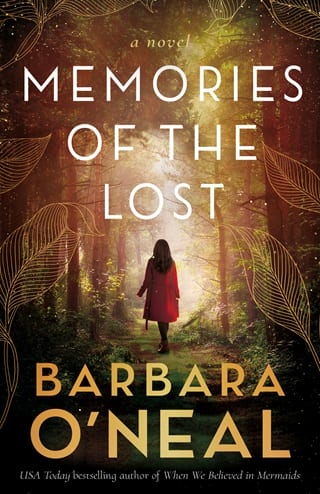CHAPTER FORTY-SEVEN
Tillie stared at the ceiling. Liam had gone to Clare's, leaving her to the hotel room. It just seemed too hard to talk to anyone. She considered calling Jon, but even that seemed too much. She closed her eyes and let everything swirl through her.
A twin. Who smelled just right.
A living mother who felt like a stranger, but looked like her. All this time, she'd known she didn't look like Arlette, but she'd assumed she looked like her father, the father she didn't know, would never know.
Instead, she belonged to these people, this family, this place in the far west of England. Again, the image of a cat and two kittens came to her—Clare and Tillie and Sage.
Clare and Rosemary and Sage.
She had a blood mother, one who had other children and a husband. If Tillie had not been stolen, she would have grown up here, with a twin and other siblings and a father—really, a whole village. She had been so lonely at times as a child. So lonely and outcast and alone with Arlette and her mental issues.
But now what did she do? Who was she if she wasn't Arlette's daughter? Who would she be now, going forward? It made her ache to try sorting it out, and she didn't know whom to talk to. Not her therapist. Not any of her "new" family.
Drifting, she thought of the cat. It had been strangely crushing to realize it had once been alive, with a name, and now no longer existed. It took him away from her in a way that seemed ridiculous.
Good grief. She was a mess. She looked at the time change to Crete. RU up?
Three dots.
Three dots.
Three dots.
Tlak tmrw?
She laughed at the typo. Must be having fun. xx
Even a glancing connection with Jon made her feel like herself. Which led to knowing what she really needed right now was to paint.
Urgently, she got up and looked on her phone for an art store. A shop was open for another twenty minutes a couple of blocks away, so she braved the rain with an umbrella borrowed from the front desk. She'd just get a pan of watercolors and a sketchbook and work out some of this confusion.
Hardly anyone was out, understandably. She followed the directions on her phone a little way off the high street to a narrow lane where the leaning buildings blocked some of the rain. It was quieter here, with echoes of time coming off the walls, and she lowered the umbrella, struck with a sense of familiarity. She passed a home with a slightly crooked door, violets in a pot nearby the step, and in her imagination saw a mouse wife with a little apron.
Prickles ran up her neck. The imaginary creature was both familiar and not, and very clear. She could see the little painted toenails, the vague shape of legs, the flowered apron. A book she'd read?
Three doors down was the art shop, and she hurried to the door, hoping she was still ahead of the closing. Lamplight glowed within, yellow and welcoming, and she ducked in, setting off a bell.
An older woman, thin and dressed in the working clothes of an artist, poked her head out. "Closing soon."
"Thanks. I just need to pick up a few things."
The woman stepped out of the room, a perplexed expression. "Sage?"
"No," Tillie said. But she didn't have the energy to explain. "Do you have watercolors? A tin and some brushes, maybe?"
"Yes, of course. In that corner by the window." She came out from behind the counter, as if to show her.
Tillie raised a hand. "That's all right. I can find them."
"Of course you're not Sage. Your hair is too long." She shoved her glasses down on her nose. "But it's remarkable. And your voice is just like ..."
Tillie stopped hearing her. She moved through an archway into an alcove by the window, smelling dust and paper and the waxy presence of crayons, and her body was entirely, completely swamped with memory.
She was smaller, which she only knew because she looked up toward the top shelves, which held the pastels she desperately wanted. Her mother said she couldn't afford them, but another person came forward, offering a note. "Let me, Clare," she said. "The child has a gift."
Hope spilled through her. The pastels would be hers. The paper, too.
Sage took her hand. "Will you share?"
"Yes."
The woman had followed her into the alcove, and her face had gone white. "It's you, isn't it? Rosemary. You loved it here so much."
"My name is Tillie," she said, but there was a breaking, a sense of something coming, that tsunami pouring over the defenses she had built.
She remembered. Sinking down in a chair, she felt the breaking waves and could do nothing to stop it. All at once, the empty place in her memory filled to the brim and overflowed.
She remembered Joey, the cat, purring next to her, and her whole heart swelling with love as vast as the sky. She remembered sitting on a sofa with her mother, Sage on the other side, their hair still wet from their baths as Clare read a book in her lively voice, giving the animals all voices of their own. The mouse wife and fairies in the forest and hares and wolves and all the other beings who had made their way into her work.
The memories she thought might drown her simply washed through her, settling back into their places. Some thin, some bright. She saw Sage playing by a stream, eating across the table, playing dolls behind a chair somewhere.
She heard Sage crying out, "Rosemary, where are you?"
She took a breath. "I'm here," she said. "I'm Tillie, but I am also Rosemary."
The woman sank down next to her and took her hand. The grip was strong and cool, bracing. "Welcome home, child."
From the back wandered a cat, a big cream-colored Siamese with crossed blue eyes. He meowed a welcome, too, and jumped in her lap as if he belonged there.
Tillie bent her head and kissed him, and even as she did, and claimed the old lost part of herself, she felt a burning longing for Arlette. She wanted to tell her mother the story of finding her other mother, of finding these cats, of discovering she had a place in the world that felt so very, very right.
Even if her mother had been the one to separate her from it.
The shopkeeper peered at her. "But where have you been all this time?"
Smelling the fur on the cat's head, she said, "A woman stole me," she said. "And took me to America."
The woman was silent. "We always said it was as if you were stolen by fairies."
Tillie nodded. In a way, she supposed it had been just like that. She thought of her mother, gardening so cheerfully, stirring a pot of soup, laughing in the way that she had with her hand on her chest, so tickled with herself.
She felt she should be angry with Arlette, but she couldn't find that emotion amid the grief. She only missed her. She would always miss her.
And yet, it was good to be home, too. At last.
 Fullepub
Fullepub 



